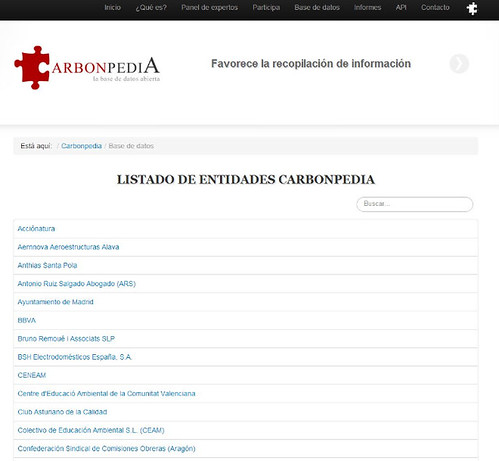Open Data: An Ally Against Climate Change
In Spain there is no public database to document the carbon footprint of individuals, organizations, events or products, that is the totality of greenhouse gas (GHG) measured in tonnes of CO2 equivalent, emitted directly or indirectly by these entities. Organisations that want to calculate this indicator to find out their climate impact cannot easily find basic information to make these calculations. They must invest time to search, check the origin and reliability of the information, and update the data annually, everything from emissions for journeys by train, metro or tram, to emissions per kilowatt hour (kWh) consumed.
Many public entities such as schools or government administration offices as well as companies calculate their carbon footprint as a first step to reducing it, as you cannot work to improve what has not been measured. This information is published in sustainability reports or similar documents and remains lost in the large volumes of information that these institutions produce.
A lot of international projects, and in particular European projects, result in large carbon footprints for their products and services. The financing of these projects usually comes in part from public funding. But the information about these footprints tends to be difficult or impossible to find and even harder to reuse.

Carbonpedia was born from the need to make it easy to access information previously scattered in a number of places or inaccessible and reuse it freely. The project has two objectives. The first one is to recognise the entities that work to improve their own climate policy by supporting them and communicating the work they do. In this sense, Carbonpedia encourages national and international entities and projects that want to communicate their carbon footprint data to use this database.
The second objective is to create a reference database for consumers who want to know which products to choose to maintain a low carbon diet, for companies that need to include values already calculated by others in their inventory, and for journalists who want to include references to carbon footprints for products which they are covering.
Developers who want to build apps or visualisations with this information and environmental analysts who want to reuse the information collected are also invited to do so. Support will be provided by the administrators of the platform.
The database has been available to the public since March, and we already have more than 230 records of carbon footprints of entities, events and products—our goal for the first year was 250.
Carbonpedia needs to be a global project, because climate change doesn’t recognise borders. We need help to make it known and partners to expand it and bring it to other countries. If you’d like to work with us to achieve this mission, get in touch at carbonpedia[at]ecodes.org.

